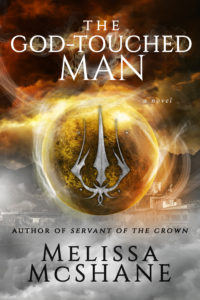14 Nevrine (continued)
So we sat everyone down, and I talked about pouvrin, and asked people to explain what they felt when they used their magic. It’s remarkable how easy it is to see the connections when you have enough mages in one place, all talking their way through the process of manifesting pouvrin. Where Jeddan and I had been initially frustrated by our very different experiences, I was heartened to discover that in this group of forty mages, instead of forty different ways of perceiving pouvrin, there were three.
So I rearranged everyone into new groups and told Jeddan off to handle the mages who learned the way he did. Relania and I fell into the second group, and, somewhat reluctantly, I asked her to work with them. That left me talking to the third group, whose experience was completely alien to me and, naturally, included Norsselen and five of his minions.
It didn’t go well. Norsselen’s group was resistant to any suggestion I made, and my efforts to teach them the vocabulary of pouvrin were mostly met with confusion. At the end, frustrated and tired, I resorted to bald-faced flattery. I pulled Norsselen aside and said, “You see magic so differently from me that I’m not sure I can help you. But I think anyone who could learn so many pouvrin so quickly can certainly figure out how to teach them to other people. And I think Relania isn’t experienced as a teacher. So it would be best if you’d take over here so I can work with that other group.”
It worked. Good thing for me Norsselen is either not as smart as he thinks he is, or really is motivated by a lust for recognition and honor. And maybe I’m wrong, and he’ll be able to analyze his perception of magic so learning new pouvrin will come more easily to him. But the real point is that this gives him something to do when we aren’t learning battle tactics and, I hope, keeps him from causing trouble. I don’t want to write about those. I really don’t understand about military strategy, but the thing is, I don’t think Norsselen does either. He’s got us drilling in ways I think would be useless in combat, but there’s no point me saying anything, both because it’s Norsselen and because, as I said, it’s not like I really know anything about it. So I’m just going to skip that part.
It was a long, difficult day, and the only bright spot in it was that my group, and Jeddan’s, learned a little of the pouvra vocabulary, enough that they could start comparing notes with each other, and it was amazing how cheerful everyone was about it. Not that this is a morose bunch; they all seem not to have any reservations about using magic, none of the fears that we old mages lived with all the time, but I think knowing that learning new pouvrin is not a matter of luck made them all feel confident in the magic they already have.
Lunch was brought to us in the ballroom, cold meats and cheeses and hunks of bread, but dinner was an elaborate affair in the large dining room (I was wrong, the table seats fifty) and Jeddan and I chatted with some of the other mages and learned a little of how they’d come to Venetry and what things had been like in the first few days. Though no one wanted to talk about that last subject, and when bringing it up blighted the conversation for several minutes, Jeddan and I didn’t press.
I gather that here in Venetry, at least, most of the mages created by the convergence were killed, and the survivors were lucky enough to either have had hidden pouvrin or people who cared about them to keep them concealed. I’d like to ask Norsselen what happened to him, but the odds of my carrying on a civil conversation with him are fairly low. So we danced around that subject, and ate too much, and now I’m in my room, and I’m so tired I can barely think.
But I don’t need to be able to think to know I’m not leaving Venetry any time soon.
I really didn’t realize this for the longest time. Not when I was organizing mages or coddling Norsselen’s ego, not when I was deep in enthusiastic discussion with my group (after gently relieving Relania of her duties; she’s not a good or patient teacher), not even when I was consulting with Jeddan on how he thought his group was doing (very well, though his group is also smaller than the other two).
No, it wasn’t until we were at dinner, and somebody said he wanted to learn the see-in-dark pouvra, joking that he wanted to be able to sneak into the kitchen for a late night snack, and I joked back and said something like “That will take at least a week” that I realized I’d committed myself. I’d acted all day like someone who’d made a long-term plan and was going to see it through. So the first thing I did upon returning to this room, before writing anything, was fling myself on my bed and scream into my pillow and beat my fists on the mattress. Because I don’t want to do this.
I’m not a leader. I don’t know anything about what the army wants its mages to do. I was barely able to teach Jeddan anything about magic, and he’s got actual experience with learning it, something none of these people have. I shouldn’t be here. I should be with my husband, learning to blend Balaenic magic with Castaviran, surrounded by my friends and working to bring our countries together, something I’ve got no power to do here. I should pack my things and walk out of here tonight, walk through Venetry’s wall and keep walking until I find Cederic. This isn’t my problem.
Except that it is.
I keep remembering how they all looked, listening to Norsselen talk about how impossible it was to learn magic, and how they believed him because they had no reason not to. I remember becoming a mage, and how the desire to learn more filled me so completely it was like a pouvra itself, compelling me onward, and I know every one of these men and women has that same feeling. And Norsselen was telling them that feeling was wrong, that it was impossible to satisfy it. I couldn’t let them go on believing that.
And once I’d proved to them it was possible, I couldn’t walk away. I have to teach them, even if all I can teach them is how to learn for themselves. I still don’t know how those ten mages learned more pouvrin spontaneously. It could be that becoming a mage via the convergence alters how you acquire pouvrin. See? Even now, even as I’m railing against fate, I’m making plans for what I’ll do with the mages tomorrow, and the next day, and so forth, indefinitely. I’m stuck here, and I did it to myself.
I hope, in the morning, I’ll be better resigned to my fate. Right now I’m going to put this book away and indulge my petulant, spoiled self whose only desire is to find the man she loves and curl up in his arms for the rest of forever. Tomorrow, everything will look different.




